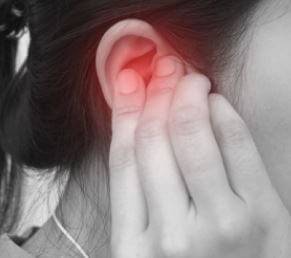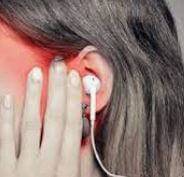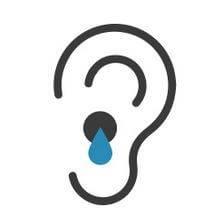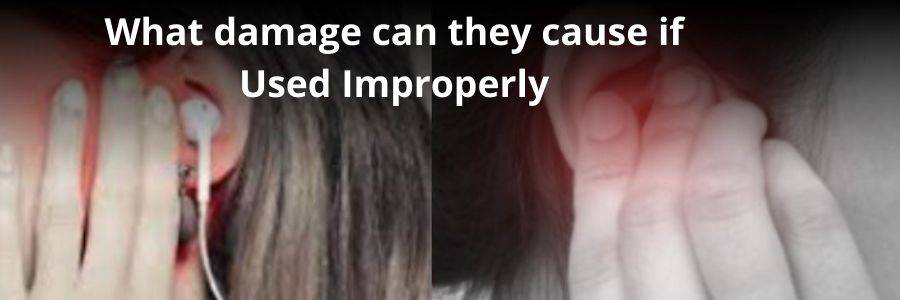While you are enjoying yourself with earbuds or headphones, it is good to think of the health effects especially if you like blasting it loud. In this view, we will explore whether earbuds cause tinnitus or ear pressure that may pain your ears. We will explore if you are harming yourself without knowing.
Although technology such as headphones is sometimes evil, it is a necessity in the world we are living in. Think of the amazing feeling of listening to fine music when working out, walking, traveling in a bus, sipping coffee, or just sitting in your office.
The main issue with headphones is that they can expose the ear to extremely loud levels of sound at a very close range. Continuous exposure to loud sound can kill or bend the hair cells involved in sound transmission, resulting in partial or permanent ear problems.
Earphones may also be contaminated by bacteria leading to ear infections. Additionally, blocking of the ear reduces ventilation causing wax and bacterial build-up.
Do Earbuds or Headphones cause Tinnitus?
Earbuds or headphones do not directly cause tinnitus but can contribute to being a risk factor especially if you do not use them well and safely. Whether they are a factor in tinnitus or not depends on the loudness of your earphones and the duration of the exposure to loud audio. Therefore, to be safe, listen to low earbud volumes.
There are a lot of causes associated with tinnitus, but the most common is extremely loud sounds. The larger the volume of the sound and the longer the exposure to it, the greater the chance of getting tinnitus.
Therefore, if you are a fan of listening to music via headphones, make sure the volume is not too loud, since it might cause tinnitus or hearing loss. Also, avoid wearing headphones for long, to avoid conditions associated with hearing.
What is Tinnitus
Tinnitus is a hissing, whistling, or ringing sound heard in your ears, even when in a quiet environment.

It harms some people’s daily lives, causing stress, anxiety, rage, and sleep disturbances.
The process of hearing involves tiny hairs cells in your ear that transmit sound to your brain.
When these cells are broken or bent, they leak false impulses to your brain causing tinnitus.
It is important to know that earbuds are more prone to causing tinnitus than headphones.
Do Earbuds or Headphones cause Vertigo?
So, what is vertigo and how do headphones cause it? Well, vertigo is a problem characterized by dizziness, loss of balance, and the false sense that your surroundings are spinning.
Doctors believe that headphones or earphones can cause vertigo because they are placed just near the canal and thus block the passage of air. As a result of their position, continued use of earphones can increase the pressure in the canal of the ear, which may lead to dizziness that is associated with vertigo.
The inner ear is responsible for balance, and a problem in it can result in dizziness, imbalance, and sometimes nausea and vomiting. Although the main cause of vertigo is an ear infection, migraine, or inflation, it is believed that headphones can cause the problem too.

High-volume music can harm the inner ear, making it difficult for the ear to manage balance.
Also, loud music might raise ear canal pressure, increasing your chances of experiencing a spinning sensation.
Certain sounds cause Vertigo. Researchers at the University of Utah claim that some people may have a condition known as congenital inner ear disorder that leads to dizzy sounds. People with this disorder, experience vertigo in response to particular sounds or tones.
Also, noise-canceling headphones have been linked to dizziness. Noise-cancellation technology changes the way we listen to sounds which might throw our balance off. As we said earlier, the inner ear impacts hearing and balance, so it is logical to conclude that when the noise-canceling effect is turned on, it tampers with aural input, which in turn leads to a sensation of disorientation.
Do Earbuds or Headphones cause Earwax?
Your ear canal lining skin produces ear wax that traps dirt and dust that might have entered your ear from the atmosphere, and then transports it to the outer ear.
When your ear canals are blocked for an extended length of time, they become dark and damp – a perfect environment for germs and fungi to thrive.
Earbuds or headphones do not necessarily result in increased wax production. However, they obstruct ear canal airflow, which can result in wax production and buildup. Even if there isn’t a consistent sound emanating from them, earbuds and headphones impede airflow to your ears.
Bacterial build-ups can cause ear infections leading to excessive production of wax. It, therefore, means blocking your ear canal with headphones can lead to wax production.
The bigger the earbud seal, the lesser the ear canal aerates resulting in a buildup of wax. Headphones provide a little more ventilation than earbuds, but it is not advisable to wear them all day.
Again, earbuds and headphones can act as contact stimuli. According to hearing health practitioners, a contact stimulus stimulates earwax production. Objects that contact and massage the ears, such as headphones, earphones, and even hearing aids, are the most prevalent offenders. By producing more earwax, your ear is attempting to protect itself from discomfort or infection. If you find yourself producing a lot of earwax, try to limit your use of contact listening devices.
Can Earbuds or Headphones cause Ear Pressure?
Standard earbuds or headphones are not associated directly with ear pressure, but they can cause ear problems that lead to it. On the other hand, noise-canceling headphones can cause ear pressure directly because of covering air from reaching the ear canal thereby causing an imbalance.
Ear pressure is a feeling of heaviness, stuffiness, or fullness in your ear. It occurs when the pressure in your middle ear differs from the pressure of the surrounding area. Normal, a simple yawn or swallowing equalizes the pressure in the middle ear to that of the surrounding

However, sometimes the pressure doesn’t go away when the ear’s eustachian tube (small bones that regulates pressure in your middle ear) becomes obstructed or ceases to function properly due to an infection.
While standard headphones and earbuds do not cause ear pressure directly, they can cause infections that might hinder the functionality of the eustachian tube.
Also, they may cause excessive wax build-ups that can block the ear canal, causing pressure.
Active noise-canceling headphones work by pumping inverse sound waves into your ears which cancels the external sound, reducing them to nothing. A user of these gadgets can experience this as a sucking feeling, which appears as a difference in pressure on the inside and outside of your ears.
How to use earbuds Safely to minimize side effects
- Clean the devices with a lint-free, dry, non-abrasive cloth.
- Maintain the recomended safe headphobe volume while using headsets. Let it be 70% or less of the maximum level, as previously stated.
- Do not use headphones or earbuds for an extended period
- Make sure your earbuds are snug and don’t put too much strain on your ears.
- Instead of wearing headphones or earbuds for long periods, take periodic breaks.
- To prevent earwax buildup, schedule regular ear checks with professional cleanings.
- Avoid sharing your earphones to reduce the infection rate
- If feasible, replace the earpads on your headphones with ones made of a different material to alleviate an allergic reaction.
- Before turning on the sound source or putting on the earphones or earbuds, be sure the volume is already at the lowest setting.
Remedy for Ear Pain from Earphones Use
- Adjusting your earphones to reduce the pressure on your ears. This is done by ensuring the earbud is not stuck extremely inside the ear canal. If you are using the headphones make it less tight.
- Remove earphones or earbuds and keep them away for some time.
- Reducing the sound level to 60% or less of the maximum volume
- If it doesn’t interfere with other prescriptions, using an acceptable over-the-counter oral medication for pain relief.
- If there is no underlying ear illness, use over-the-counter ear drops specifically designed for pain alleviation.
